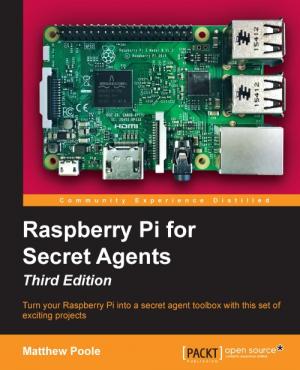[ad_1]
Many parents see my daughter’s articles on Opensource.com and regularly ask me, “How did you get your daughter started with the Raspberry Pi?”
It all started with the Raspberry Pi as a Christmas present, and we started with the Raspberry Pi Education Manual as our guide. As a free download, it was a very good primer to get started. Then we moved onto other books, such as Getting Started with Raspberry Pi, and I started to notice some patterns. Those books often covered the same things over and over: getting the system to boot with Raspbian, visual programming with Scratch, and using the GPIO pins. Also, I noticed that the books focused on how to use the disparate features of the Raspberry Pi, but they didn’t have a common goal or theme in mind. Both of these observations led to my next observation that my daughter’s excitement in Raspberry Pi books started to wane because it felt like we were slogging through math textbooks as opposed to reading with an exciting goal in mind.
I learned early on that teaching technology in terms that would resonate with her was the best way to keep her engaged, asking why, and thinking of new ways to use what she learned. I first discovered this when she created The Great Guinea Pig Escape in Scratch, which was a game about things she was passionate about (guinea pigs). When she expressed an interest in computer security, we did some hacking around the house and she attended the University of Maryland Cyber Defense Training Camp, which taught defensive and offensive hacking. When she came back from camp, she told us all about her teenage thrill of (white hat) offensive hacking, and I thought that thrill was something we could harness to further her STEM education.
At about the same time I came across Raspberry Pi for Secret Agents, and I immediately thought that this book would not only further her interest in computer security but do it on a platform that she already knows and loves, the Raspberry Pi. Unlike the previously mentioned Raspberry Pi books, Raspberry Pi for Secret Agents explores the features of the Raspberry Pi with a common theme that could be summarized by the title of Chapter 1: Getting up to No Good.

Throughout the book, complex concepts of the Raspberry Pi are explored in a way that’s approachable for teens, technically accurate, and mischievously fun. Furthermore, many of the lessons learned aren’t only applicable solely to Raspberry Pis, but they are also applicable to Linux systems in general. As a result, this book is ideal for future spies and computer security engineers alike.
For example, Linux distributions come with thousands of software packages, which are solutions looking for problems. One example is SoX for command-line, cross-platform audio editing, and another is OpenSSH for secure network communications. By themselves, they are interesting and useful, but not immediately exciting for a teenager. Raspberry Pi for Secret Agents combines them, showing you how to turn SoX, OpenSSH, and a Raspberry Pi into a remote bugging device. The book also shows you how to go the other way by turning the Raspberry Pi into a public address system. By the combining the two examples, my daughter and I turned a Raspberry Pi and a laptop into a makeshift walkie talkie.
The fun doesn’t end there! The book also shows you how to disguise your voice such that the remote person hears you as a sci-fi robot, a creepy villain, or a Smurf. Needless to say, my daughter had a lot of fun pranking her mom with this—and that was only a single chapter.
The book also shows you how to use a Raspberry Pi to build a GPS tracking device for 3D visualization with Google Earth, a laser beam tripwire security system, a self-destructing encrypted directory for secret documents, a portable video surveillance system, and much more.
Overall, I can’t recommend Raspberry Pi for Secret Agents enough. Once the Raspberry Pi basics are understood through an introductory book or two, Raspberry Pi for Secret Agents is a perfect book for teens (and adults) to learn more about their Raspberry Pi and computer security in a fun and mischievous way.
The publisher is offering readers a discount on both the print and eBook versions of Raspberry Pi for Secret Agents. Get 40% off on the ebook, 3rd edition, using the code: EBRPS40. Get 15% off on the print version, using the code: RIPSBK15. (Codes can only be used once per user and are valid through May 31, 2017.)
[ad_2]
Source link